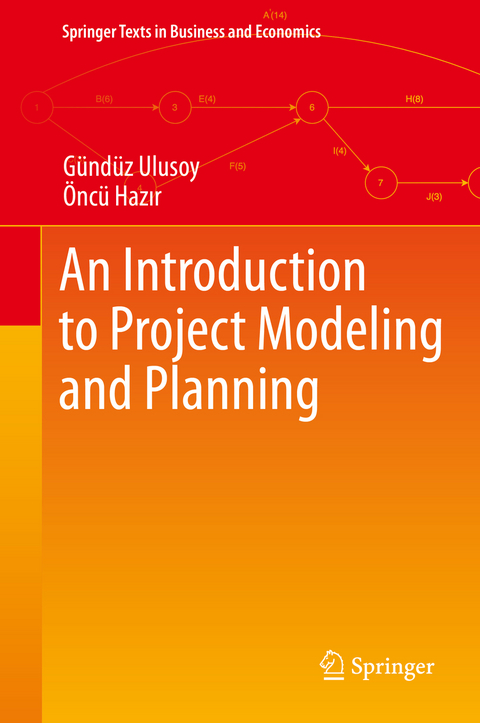
An Introduction to Project Modeling and Planning
Springer International Publishing (Verlag)
978-3-030-61422-5 (ISBN)
This textbook teaches the basic concepts and methods of project management but also explains how to convert them to useful results in practice. Project management offers a promising working area for theoretical and practical applications, and developing software and decision support systems (DSS). This book specifically focuses on project planning and control, with an emphasis on mathematical modeling. Models and algorithms establish a good starting point for students to study the relevant literature and support pursuing academic work in related fields. The book provides an introduction to theoretical concepts, and it also provides detailed explanations, application examples, and case studies that deal with real-life problems. The chapter topics include questions that underlie critical thinking, interpretation, analytics, and making comparisons. Learning outcomes are defined and the content of the book is structured following these goals.
Chapter 1 begins by introducing the basic concepts, methods, and processes of project management. This Chapter constitutes the base for defining and modeling project management problems. Chapter 2 explores the fundamentals of organizing and managing projects from an organization's perspective. Issues related to project team formation, the role of project managers, and organization types are discussed. Chapter 3 is devoted to project planning and network modeling of projects, covering fundamental concepts such as project scope, Work Breakdown Structure (WBS), Organizational Breakdown Structure (OBS), Cost Breakdown Structure (CBS), project network modeling, activity duration, and cost estimating, activity-based costing (ABC), data and knowledge management. Chapter 4 introduces deterministic scheduling models, which can be used in constructing the time schedules. Models employing time-based and finance-based objectives are introduced. The CPM is covered. The unconstrained version of maximizing Net Present Value (NPV) is also treated here together with the case of time-dependent cash flows. Chapter 5 focuses on the time/cost trade-off problem, explaining how to reduce the duration of some of the activities and therefore reduce the project duration at the expense of additional costs. This topic is addressed for both continuous and discrete cases. Chapter 6 discusses models and methods of scheduling under uncertain activity durations. PERT is introduced for minimizing the expected project duration and extended to the PERT-Costing method for minimizing the expected project cost. Simulation is presented as another approach for dealing with the uncertainty in activity durations and costs. To demonstrate the use of the PERT, a case study on constructing an earthquake-resistant residential house is presented.
Classifications of resource and schedule types are given in Chapter 7, and exact and heuristic solution procedures for the single- and multi-mode resource constrained project scheduling problem (RCPSP) are presented. The objective of maximizing NPV under resource constraints is addressed, and the capital-constrained project scheduling model is introduced. In Chapter 8, resource leveling, and further resource management problems are introduced. Total adjustment cost and resource availability cost problems are introduced. Various exact models are investigated. A heuristic solution procedure for the resource leveling problem is presented in detail. Also, resource portfolio management policies and the resource portfolio management problem are discussed. A case study on resource leveling dealing with the annual audit project of a major corporation is presented. Project contract types and payment schedules constitute the topics of Chapter 9. Contracts are legaldocuments reflecting the results of some form of client-contractor negotiations and sometimes of a bidding process, which deserve closer attention. Identification and allocation of risk in contracts, project control
lt;b>Gündüz Ulusoy received his BSc in mechanical engineering from Robert College, Istanbul in 1970_ MSc in mechanical engineering from University of Rochester in 1972 and PhD in operations research from Virginia Tech in 1975. He served in the Department of Industrial Engineering, Bogaziçi University in Istanbul as a faculty member (1976-1999) and as Head of Department (1985-1993). He also served as Vice President of Bogaziçi University (1992-1994). He was presented the "Best Teaching Award" by the students of Bogaziçi University (1980). In 1983 he worked as a NATO postgraduate research fellow in the Operational Research Department in Lancaster University. He spent a year on leave from Bogaziçi University at Arçelik Company in Istanbul. He was a member of the Executive Board of the Turkish Scientific and Technical Research Council (1993-1997) and Chairman of the Executive Board of the Marmara Research Center (1995-1997). He served on the Executive Board of the Turkish Quality Association (19982002) and chaired its Quality Award Committee (1998-2002). He also served on the Board of Bogaziçi University Alumni Association (1988-1991) and on the Board of Elginkan Foundation (1994-2000). He is a founding member of the Science Foundation and of the Turkish Informatics Foundation. In 1999 he joined the Faculty of Engineering and Natural Sciences in Sabanci University and established the Manufacturing Systems Engineering Program there. He founded and became the Co-Coordinator of the Leaders for Industry Program (2001-2004). In 2003 he founded the TUSIAD Sabanci University Competitiveness Forum and has been serving as its Director since then. He was an Associate Editor of the European Journal of Operational Research, Chief Editor of the Turkish Journal of Operational Research and served as the Guest Editor for several academic journals. Currently, he's the Associate Editor of the Turkish Journal of Operational Research and the Journal of Operations and Logistics. His primary research areas are competitiveness, innovation and manufacturing strategies, evolutionary algorithms, and project and manufacturing management.
Öncü Hazir received his BS degree in Industrial Engineering and MBA degree from the Middle East Technical University, Ankara, Turkey. He completed his Ph.D. at the Department of Business Administration, Bilkent University in 2008. His dissertation was on project scheduling. During his studies, he offered courses on scheduling, production planning and control. He worked as a post-doctorate researcher at Laboratoire d'Informatique de Paris 6 and Ecole Nationale Supérieure des Mines de Saint-Etienne in France for 3 years. He participated in various research activities in project management and control, machine scheduling and assembly line balancing. He has published several papers in operational research journals. He is one of the authors of the book entitled "Project Management: Analytical Approaches."
Chapter 1. Overview of Project Management: An Introduction to the Basic Concepts, Methods and Processes.- Chapter 2. Project Management from Organizations' Perspective: Fundamentals of Organizing and Managing Projects.- Chapter 3. Project Modelling and Planning.- Chapter 4. Scheduling.- Chapter 5. Time/Cost Trade-Off Problem.- Chapter 6. Resource Management Policies.- Chapter 7. PERT-Cost Method.- Chapter 8. Project Contract Types and Payment Schedules.- Chapter 9. Decision Support Systems and Different Models for Client-Contractor Negotiations.- Chapter 10. Monitoring and Control for Processes and Methods-.-Chapter 11. Qualitative and Quantitative Techniques for Risk Management Processes.- Chapter 12. Uncertainty in Project Scheduling.- Chapter 13. Made-to-Order Manufacturing.- Chapter 14. Project Selection Problems for Project-Based Organizations.- Chapter 15. Recent Approaches and Future Research Areas in Project Management.
| Erscheinungsdatum | 08.04.2021 |
|---|---|
| Reihe/Serie | Springer Texts in Business and Economics |
| Zusatzinfo | XIX, 482 p. 159 illus., 44 illus. in color. |
| Verlagsort | Cham |
| Sprache | englisch |
| Maße | 155 x 235 mm |
| Gewicht | 916 g |
| Themenwelt | Wirtschaft ► Betriebswirtschaft / Management ► Unternehmensführung / Management |
| Schlagworte | Earned Value Management • Engineering Economics • multi-project scheduling • Project Management • Project Modeling • Project Scheduling • Project Selection • Resource Constrained Project Scheduling • Risk Management • Robust Scheduling |
| ISBN-10 | 3-030-61422-0 / 3030614220 |
| ISBN-13 | 978-3-030-61422-5 / 9783030614225 |
| Zustand | Neuware |
| Haben Sie eine Frage zum Produkt? |
aus dem Bereich


